Sharing the Solar Eclipse with Young Children
Sharing the solar eclipse with young children offers a rare opportunity to help your child learn that they can stay safe and grounded, even when something extraordinary happens.
Learning Through the Senses
For the young child, every day is a celebration.
Young children experience the world through their senses. They feel the light and warmth of the sun through their bodies. They marvel at the sun’s power to wake up plants and birds, chase the clouds away and peel off our winter coats.
Celebrate the Good
In Early Childhood classes at Berkshire Waldorf School, we celebrate all that’s good in the world: the beautiful light of the sunrise, food prepared with so much care, the children’s community of loving family, the safe embrace of Mother Nature, and so much more.

Instead of Explaining…
In our modern world, we focus on the scientific, material aspect of things. We tend to understand phenomena like a solar eclipse through intellectualized explanations. However, giving children rational explanations prematurely can contribute to confusion, anxiety and hypervigilance. It pulls little ones out of the developmental space where the world makes sense to them because they can experience it with their senses. The sages of old knew to meet events like this with the same wonder and reverence as other cosmic events.
Waldorf Education founder Rudolf Steiner writes about how children’s feelings during such moments are the same as what we could call “religious feelings” in an adult.
Focus on Experience
So instead of looking up during the time of the eclipse, how about we look down?
I invite you to tap into your inner quiet during the time of the eclipse, and observe your children and nature. How does the light and the mood change? Look for shadows and light. How are your pets behaving? And what about the other animals that might live in your backyard? The crows, the geese? Are the birds singing? Are the bees buzzing? How do the flowers and trees change? Is your child getting a bit clingy, or are they oblivious to what is happening in nature? Let the experience resonate without a verbal explanation.
Highlight with Gratitude
We can take this opportunity to give gratitude to the Sun and the Moon for sharing their light with us. How about planting some flowers for the bees, who are sometimes called “light workers”? Sunshine soup for dinner? Moon cakes (aka pizza or tortillas)? How about a candle for the moon and a candle for the sun, to give thanks for their life-giving light? These are just a few thoughts to fuel your imagination.
A solar eclipse is so much more than one celestial body passing in front of the other and blocking the light, it’s an opportunity to share the wonder of the world with our children.

Woman’s History Month: The Three Mothers
Behind every great man, is a great…mother.
Much has been written about Berdis Baldwin’s son James, about Alberta King’s son Martin Luther, Jr. and Louise Little’s son Malcolm. But virtually nothing has been said about the extraordinary women who raised them.
In her groundbreaking and essential debut The Three Mothers, scholar Anna Malaika Tubbs celebrates Black motherhood by telling the story of the three women who raised and shaped some of America’s most pivotal heroes.
One of Fortune Magazine‘s 21 Books to Look Forward to in 2021
Badass Women’s Book Club pick for “Badass Books We Can’t Wait to Read in 2021!”
“Berdis Baldwin, Alberta King, and Louise Little were all born at the beginning of the 20th century and forced to contend with the prejudices of Jim Crow as Black women. These three extraordinary women passed their knowledge to their children with the hope of helping them to survive in a society that would deny their humanity from the very beginning—from Louise teaching her children about their activist roots, to Berdis encouraging James to express himself through writing, to Alberta basing all of her lessons in faith and social justice. These women used their strength and motherhood to push their children toward greatness, all with a conviction that every human being deserves dignity and respect despite the rampant discrimination they faced.
“These three mothers taught resistance and a fundamental belief in the worth of Black people to their sons, even when these beliefs flew in the face of America’s racist practices and led to ramifications for all three families’ safety. The fight for equal justice and dignity came above all else for the three mothers.
“These women, their similarities and differences, as individuals and as mothers, represent a piece of history left untold and a celebration of Black motherhood long overdue.” – Macmillan Books
https://www.insider.com/the-mothers-behind-martin-luther-king-malcolm-x-james-baldwin-2021-2
Meet Our First Grade Teacher
Wonderful news! Mabel Albert will be the First Grade teacher for our 2024-25 First Grade.

Join us WED, February 14 @ 8:30am for a special Valentines Day coffee to meet Ms. Albert, Class Teacher for the Class of 2032, and learn more about learning your child will LOVE!
We’ll discuss the First Grade curriculum, and you’ll also meet First Grade Subject Teachers in Music, Games, Handwork, Gardening and World Languages.
About First Grade Teacher Ms. Albert
A current Class Teacher at Berkshire Waldorf School, Ms. Albert is a Waldorf graduate who attended White Mountain Waldorf School (Albany, New Hampshire) from Kindergarten through Eighth Grade. She earned both her Bachelor of Fine Arts and Masters of Arts in Teaching from Tufts University, Boston. After graduation, she taught art for students in Kindergarten through Eighth Grade at the Coolidge Corner School in Brookline, MA. During that time, she also worked at the Brookline Arts Center, teaching children of all ages. Prior to relocating to the Berkshires, Ms. Albert worked as a substitute teacher in New Hampshire private and public elementary schools.
At Berkshire Waldorf School, as in most Waldorf schools worldwide, Grades School Class Teachers start with their class cohort in First Grade, and move through the Elementary School curriculum together, to build strong, long-term relationships for up to eight years. Ms. Albert joined BWS with the “Covid class” in 2020, when her current students were in Fifth Grade, and immediately committed to teaching outside throughout the school year, so students could attend school in person. This Spring, Ms. Albert is finishing Eighth Grade with the Class of 2024.
Next Steps Toward First Grade
At “Meet the First Grade Teachers,” you’ll learn more about what to look forward to in First Grade, and the admissions process for applicant families.
Both the event registration and First Grade applications for students who will be turning 6 by September 1, 2024 are open now in our admissions portal, Ravenna.
Friends and family members (*grownups only) are welcome to join in this Valentines Day coffee event. Any questions, please contact Admissions Director Robyn Coe, admissions@berkshirewaldorfschool.org.
We look forward to seeing you at this exciting event!
#GoBobcats!
Dr. King and the BWS Star Code
Do you know we learn from Dr. Martin Luther King, Jr. ‘s legacy throughout the year at Berkshire Waldorf School?
Not just this month but every day, our unique teaching tool, the BWS Star Code, is a visual reminder posted throughout the school of our community values based on Dr. King’s work, and a practical teaching tool for social and character education.

The BWS Star Code: Our Agreement
The BWS Diversity and Inclusion Statement refers to our BWS Star Code as a focal point. It’s our “North star,” to help guide faculty, administrators, trustees, caregivers and students in the active practice of inclusion.
Developed in 2009 by students, teachers, and school psychologist Dr. Steve Hoff, the BWS Star Code visualizes the values our school community agrees to uphold. Since Waldorf Education is not just grounded in child development, but also a social education, the BWS Star Code is posted throughout the school, to remind us all how to work together with respect and appreciation, not only in classrooms, but on the playground, on school buses, at after school activities and sporting events, and with each other outside of school.
The BWS Star Code was presented to the school community in 2009, to honor Dr. King’s Day and commemorate President Barack Obama’s inauguration. Faculty member Ann Sagarin weaved the values represented by these two individuals into the presentation of the BWS Star Code, acknowledging that the values we practice in our classrooms every day have been passed down to us through the generations.
Grade School teachers use the BWS Star Code in developmentally appropriate ways, including role playing, mixed age group projects (especially revisited each year in honor of Dr. King’s Day) and lively class discussions, to address such topics as teasing and criticizing, peer pressure, Internet safety and healthy human sexuality and identity development. One prescient Middle School teacher reminded her students, working together through the Star Code in class, to remember to be kind to themselves.

Growth Mindset
BWS teachers and administrators are working on two group reading projects this year, to re-enliven our commitment to anti-racism and social justice, as we learn and practice Dr. King’s principles throughout the year.
Carol Dweck’s book Mindset: The New Psychology of Success uses research to help teach that “with the right mindset, you can motivate those you lead, teach, and love—to transform their lives and your own.”
At the heart of what makes the “growth mindset” so winsome, Dweck found, is that it creates a passion for learning rather than a hunger for approval. Its hallmark is the conviction that human qualities like intelligence and creativity, and even relational capacities like love and friendship, can be cultivated through effort and deliberate practice.
from “Fixed Vs. Growth: The Two Basic Mindsets That Shape Our Live,” by Maria Popova, Marginalian
In My Grandmother’s Hands, Resmaa Menakem posits that biases are not just in the mind, but are stored in the physical body and need to be deeply felt to be healed, so we can grow beyond racism. The book offers a step-by-step healing process that readers can take into their own hands, based on the latest neuroscience and somatic healing methods.
It’s encouraging to understand that we can use the Waldorf way of learning with head, hands and heart to learn and grow at any age, and that by practicing the growth mindset, change becomes about lifelong learning and growth, not fear or failure.

Further Resources:
Where Do We Go From Here: Chaos or Community? by Martin Luther King, Jr.
Michael Harriot’s Black AF History.
Read more of Dr. King’s words from parent Lev Natan’s recent post at Alliance for a Viable Future.
Great Barrington Proclaims Hilda Banks Shapiro Community Day
The legendary Hilda Banks Shapiro, Berkshire treasure and one of Berkshire Waldorf School’s founding parents, has been honored posthumously with her own Community Day.
Read in the Berkshire Eagle.

PIE! Parent Info Events START 11/29
You’re invited for some special PIE (parent info events, aka parent education), on the menu at BWS between Thanksgiving & Holiday Break! We are grateful to be together, in the spirit of learning and community. Bon apetit!

Waldorf 101: How, When & Why Waldorf Education Works
Wednesday, Nov. 29 | 6:00-7:00 p.m.
Join experienced Berkshire Waldorf School teachers Alessandra Profumo and Lynn Arches for an inspiring overview of how, when and why Waldorf teachers bring the “3 Rs” to students in ways that create lasting learning and meaning, not just rote memorization.


Free; all welcome. We will meet in person in the school library. Bring your questions! Bring a friend! Adults only, please.
*PRO TIP: For real insight, we invite you to experience the school in action at our “Coffee, Tea and Tour” the same morning, WED 11/29, or the following week, WED 12/6, starting in the Library (Grades School building), from 8:30-9:30 a.m. For more info or to register, email Admissions Director Robyn Coe at admissions@berkshirewaldorfschool.org.
Since You Asked: Why We Do What We Do
Friday, Dec. 1 | 8:30-9:30 a.m.
Join veteran teacher and Berkshire Waldorf School Council of Teachers Chairperson Krista Palmer for a conversation about how BWS teachers meet the whole child, according to Rudolf Steiner’s indications on child development.
Mrs. Palmer will give an overview and answer your questions about the incarnating child from birth through adolescence, continuing her primer (begun at our “Looking Forward to the Grades” meeting in November) around the “Whys” of Waldorf Education and the philosophical understanding BWS teachers work from. Don’t miss this!


Winter Tips & Tools for Prevention and Wellness
Monday, Dec. 4 | 4:30 – 5:30 p.m.
Join licensed acupuncturist, Berkshire Waldorf School alum and Board member Emily Kasten to learn basic acupressure, Chinese medical massage techniques, plus simple herbal and kitchen remedies for immune support, wellness and recovery.
Celebrating First Nations Day
As you walk onto the Berkshire Waldorf School campus this week, you’ll see turkey feather flags that students of all ages have hung on branches for First Nations Day, to remember the connection between the people, the land and a spirit of gratitude.
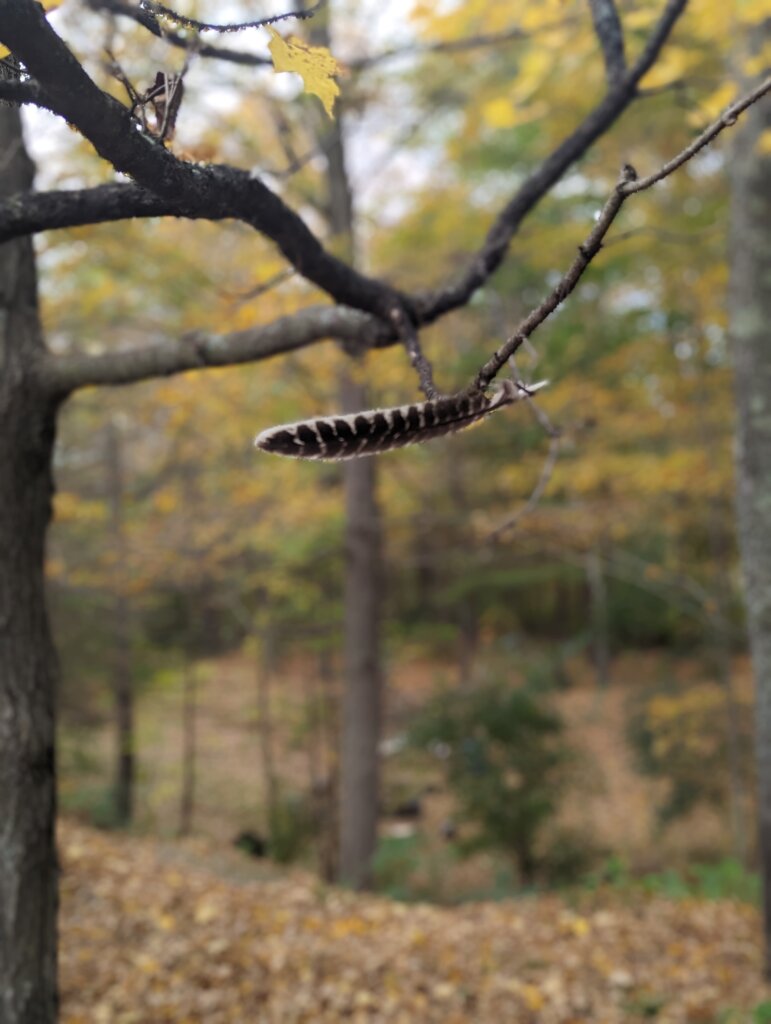
We were honored to welcome members of the Stockbridge-Munsee Band of the Muh-he-con-ne-ok (Mohican Nation) Shawn Stevens and Shannon Chada back to their Homelands from their current-day reservation in Wisconsin, for our school celebration on Tuesday.
Mr. Stevens, also known as Standing Eagle, visited the school for the first time last year. He and Ms. Chada were visibly touched by the turkey feathers—hung knee-high by our youngest students—welcoming them along the path beside the native “sumac forest,” near the Nursery play yard. (Sumac is a treasured Mohican medicine plant.)
Fire Circles – The Original Classroom
This year, Mr. Stevens brought traditional flute and drum songs to Early Childhood students, plus a humorous story. (Kindergartners can tell you the story of “How the Bear Lost Its Tail”—that tricky fox!)
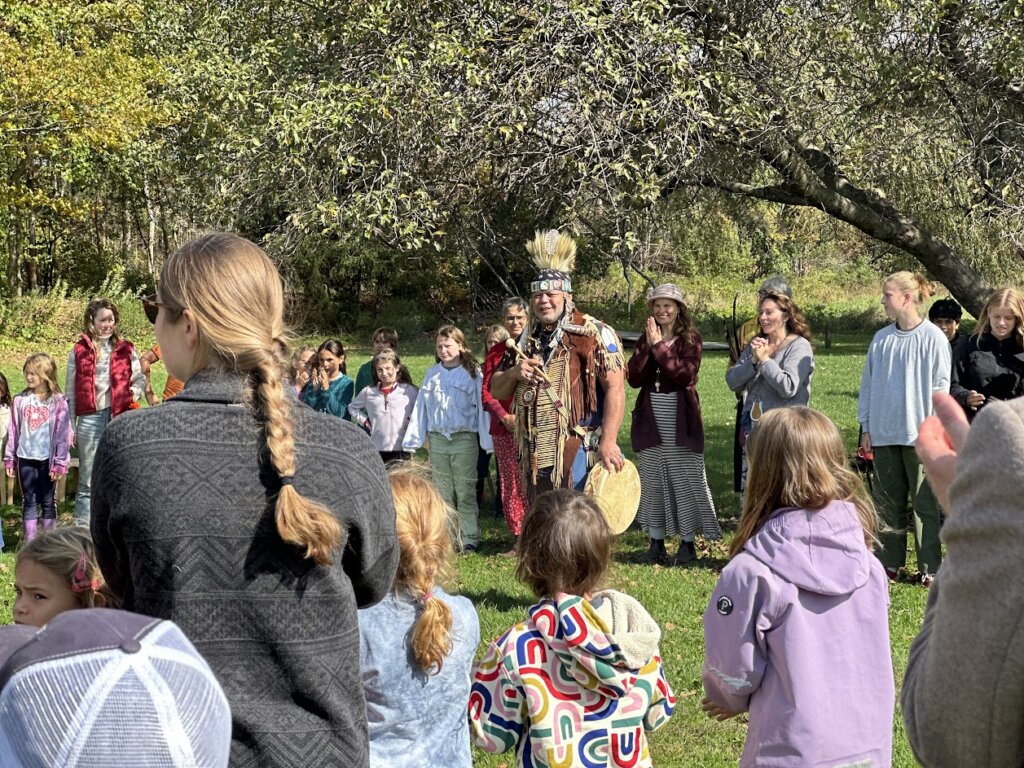
Around the fire with First through Eighth Graders, Mr. Stevens spoke about many aspects of Mohican culture that resonated with topics our students are already learning about, such as how Mohican family groups lived in longhouses, all along the Mahicannituck (Hudson River), and east to the Housatonic. Mr. Stevens described how warriors (“those with big hearts”) went out in their canoes to meet Henry Hudson when he came up the river; at that time, the Muh-he-con-ne-ok had already lived along its banks for thousands of years.
Mr. Stevens discussed how many Nations in our Eastern Woodlands region are relatives, springing from the original Algonquian language group, and had disbursed as far as the Great Lakes and the Carolinas, in order to share available resources. For this reason, he noted, the name Muh-he-con-ne-ok designates “where we’re from” more than “who we are.” It translates approximately to “People of the Great Tidal River.”
What We Learned
Eighth Graders reflected on the ways of thinking that Mr. Stevens discussed in the circle. Here are a few of their takeaways:
“We are all family. We are all the same species, and all come from the same place (Earth). If we could really realize this, we could end war forever.”
“My shirt is made of thread, woven into cloth to keep warm, but it doesn’t mean anything; it’s a thing. Mr. Shawn was saying every thread and bead and stitch of his sash was woven with good intentions and prayers. Imagine how that feels.”
“The tribes of North America, just like the tribes of Africa, aren’t generic, but distinct Nations, with their own languages and cultures and ways of life.”
Onewe! Thank you for teaching us!
Click the button below to see more pictures of the Great Barrington town ceremony and walk on Monday. We are so grateful to see our students carrying the banner for Indigenous Peoples’ Day.
We remember that we are gathering and learning on the sacred, unceded Homeland of the Muh-he-con-ne-ok, the People of the Waters That are Never Still, who are now living and thriving in Wisconsin and the Berkshires.
First Days of School
Beginning our 52nd school year with the traditional Rose Ceremony marks the first key transition our First Graders make, as Eighth and Twelfth Graders welcome them into the Grade School.
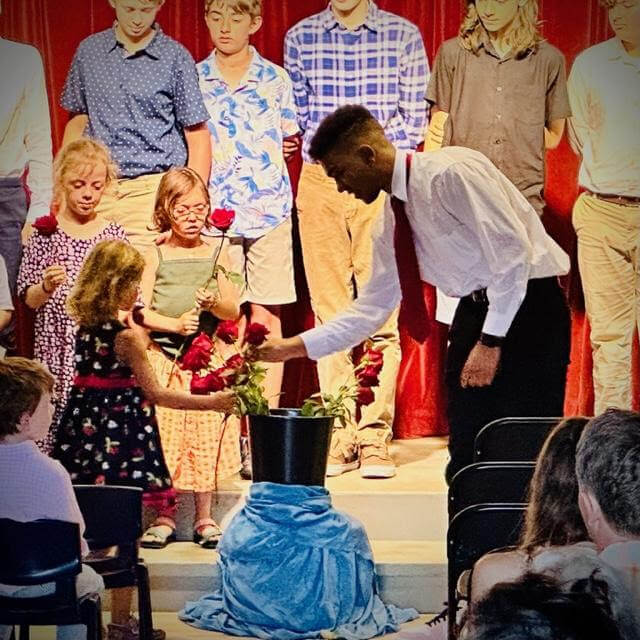
First Days of First Grade
First Graders begin the school year with a Main Lesson block in Form Drawing. This three-week block introduces straight and curved lines, which are the basis for all the letters and numbers students will learn over the course of the year. It’s how drawing organically becomes writing and all four mathematical operations. BWS and BWHS students build on this strong foundation over their twelve years of Elementary and High School starting right here, in the first week of Grades School!
The Class Teacher presents fairy tales and stories from all over the world, teaching in a form that children already know, love and understand, through stories. She creates living pictures using both movement and imagination, without notes or screens. The children listen transfixed, then each child carefully draws a form from the story into their very own main lesson book.
First Graders practice making straight and then curved lines. Next, they incorporate the straight and curved lines together, creating a new form. At last, the focus turns to learning to draw a spiral, as the children first practice walking a spiral, forming it on the ground with rope, as well as drawing on each other’s backs!
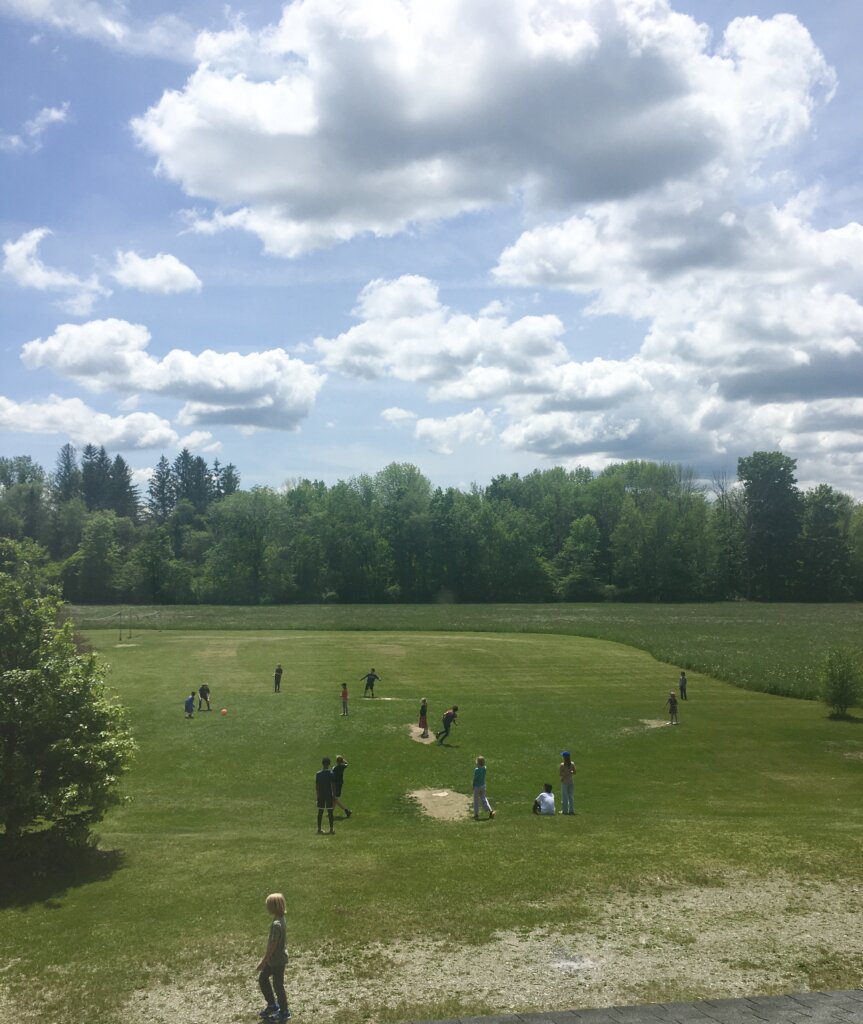
Becoming a Class
So much of First Grade is about learning to become a community. At Berkshire Waldorf School, the class will move together through the Grades, and frequently on through High School, so relationships, belonging and etiquette are an important part of education. Notably, in Waldorf Education, this social learning is part of the curriculum in both academic and subject classes.
As an example of social learning in First Grade, Class Teacher Victoria Cartier discussed the importance of building up the basics (already well-established in BWS Early Childhood classes). This is what Waldorf teachers call “form”: learning to walk in a line, work together in a circle, attend to the teacher–all the ways their experiences teach the children how to work and play together, help one another and take care of the space they share.
Ms. Cartier spoke about the development of the children from Kindergarten to First Grade.
The transition from Kindergarten to First Grade is crossing a bridge, a critical passage as students’ energy slows down and they are able to learn internally, become aware of their feelings and access a deeper ability to produce, express and generate their internal thoughts and memories, without relying on sensory reminders.
-First Grade Teacher Victoria Cartier
Ms. Cartier also emphasized not taking for granted just how new everything is for students brand new to the Grades School, and how much growth and change is occurring within them. In First Grade, Games period and recesses are organized by Ms. Cartier, while the afternoons are reserved for free play. During free play, the teacher has time to observe social dynamics, and discover students’ different affinities, strengths and joys, when they are free to explore, climb and play whatever calls to them. The strength of the class as a whole shines through during this time.
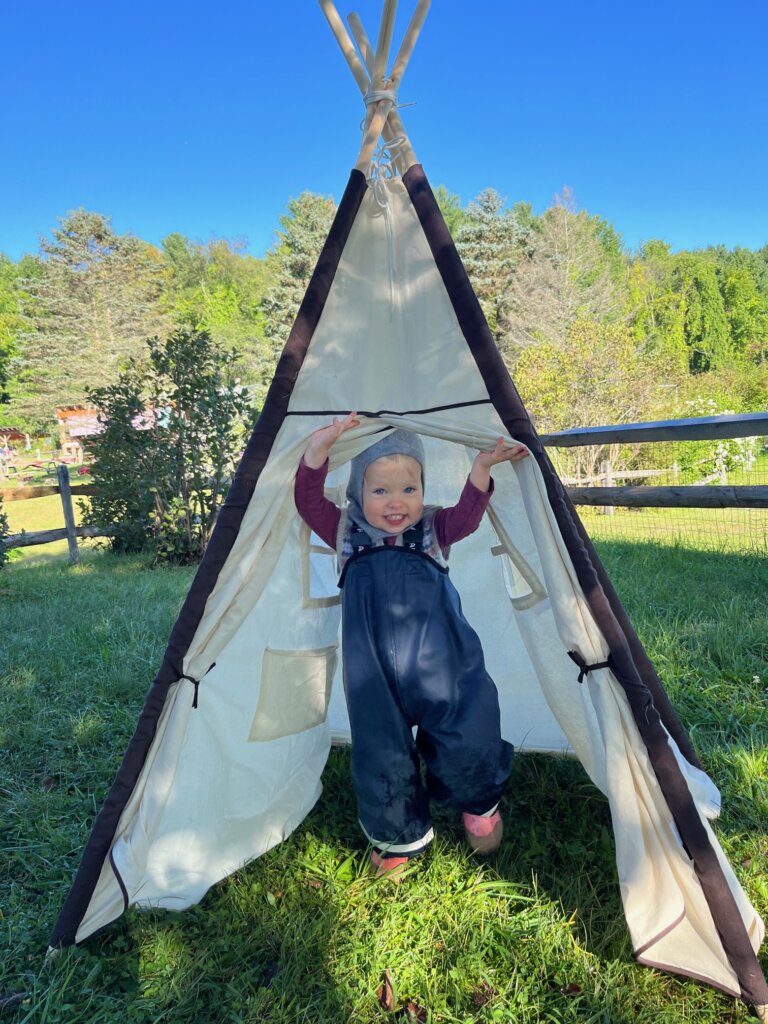
The Very First Days of School
Our youngest Early Childhood students in the Star Room (Toddler), Rose Room and Robin’s Nest (2-4 years), and Sun Room, Rainbow Room and Pumpkin Patch Kindergartens (5-6 years) started school with surprisingly few tears. Some children had their very first experience of being away from parents and regular caregivers. We were delighted to see and hear them playing, running, visiting the sheep, climbing trees, singing and laughing. It’s wonderful to have our youngest students back on campus!
Welcome dear families, to this learning and growing community.
Join us! May Day @ BWS
Berkshire Waldorf School May Day Celebration MONDAY May 1, at 11:00 a.m.
Wear your May crown! Berkshire Waldorf School invites our community to enjoy this joyous Waldorf Spring festival, celebrated every May 1 on the school Green. Free; rain or shine.
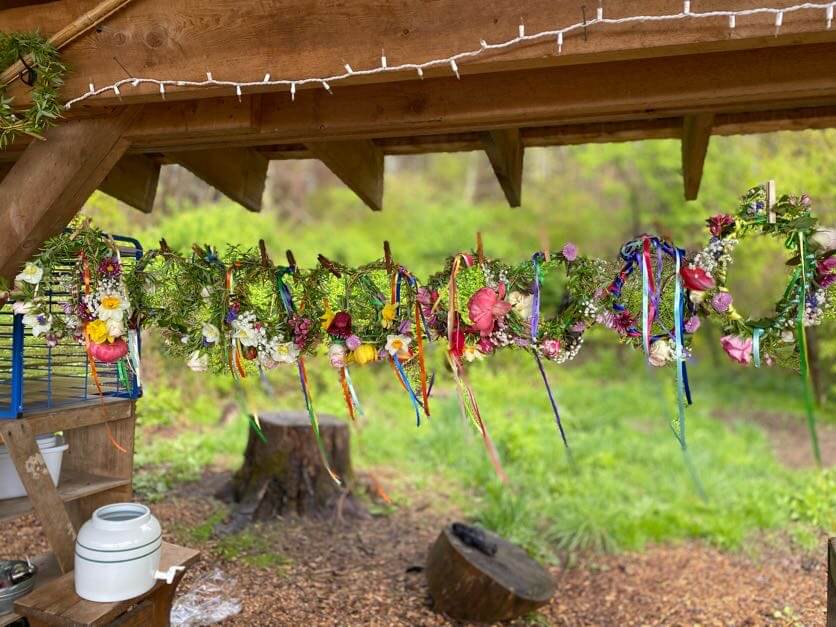
To welcome in the summer
Wear your May crown! Festivities begin at 11:00 a.m., featuring our May Pole and all the trimmings — live music, local Morris dancing teams and country dancing by Grades School students. Bring your family and friends, blankets, weather appropriate hats and a picnic, and help us welcome in summer in the Berkshires! Rain or shine.
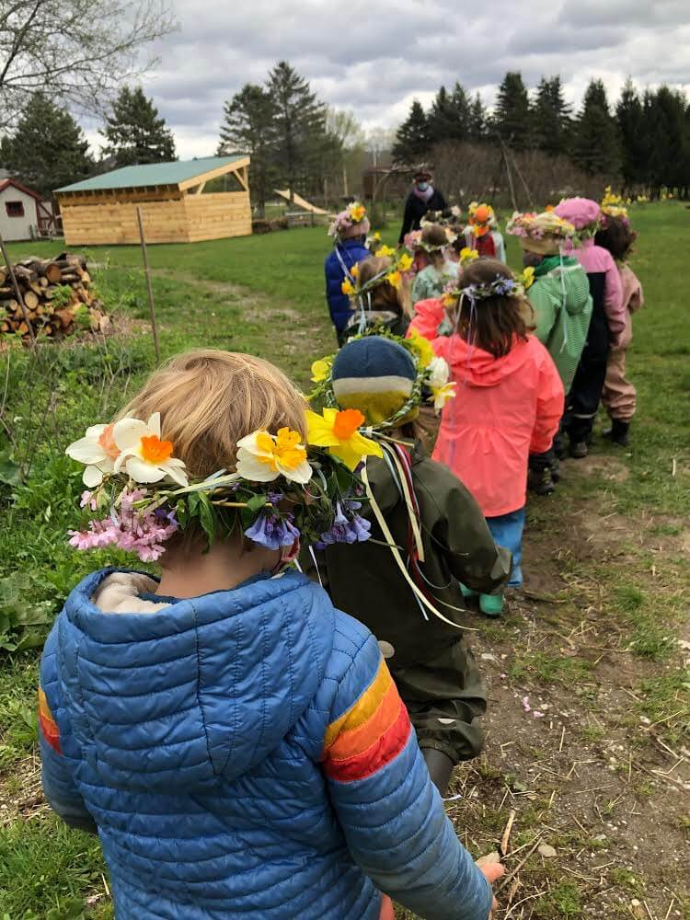
Come early to see the school in action
The school will host an informal open house and tour at 9:00 a.m. the same morning, prior to the celebration. To register, please contact Admissions Director Robyn Coe at 413-528-4015 x. 106 or admissions@berkshirewaldorfschool.org
Happy Spring!
SPRING Adult Education
Parent and Caregiver Lectures
The Berkshire Waldorf School Parent Association is excited to sponsor two upcoming Adult Education talks on March 28 and April 3.
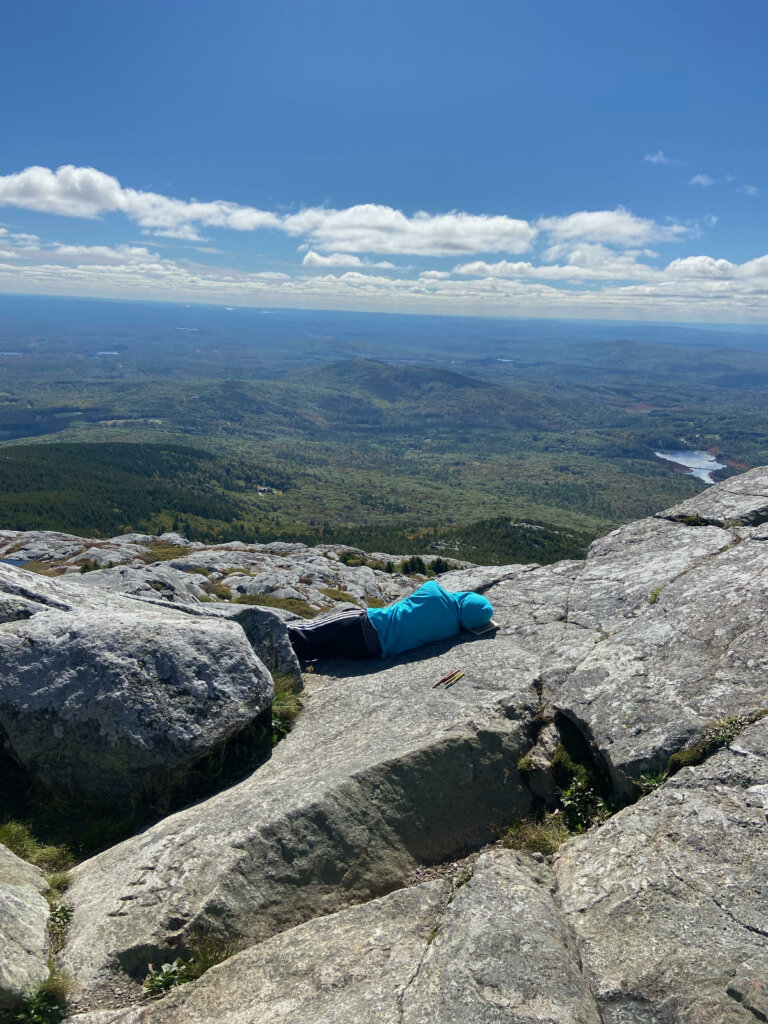
Building Resilience to Meet the World: Social Understanding and Healthy Relationships with Self and Others
NEW Date: Tuesday, March 28 | 7:00 p.m.
With speaker Meaghan Witri in the BWS Auditorium
Meaghan Witri and the Developing the Self, Developing the World team play an important role in the BWS curriculum, leading social-emotional developmental workshops for caregivers and children, starting in Fourth Grade. Join us for tonight’s event to learn about their approach. Free; adults only.
Nurturing Resilience and Self-Regulation During Early Childhood
Monday, April 3 | 3:30-5:30 p.m.
With Early Childhood expert Lisa Miccio in the BWS Library
Contemporary neuroscience and brain research validate the wisdom of Waldorf Education’s nurturing Early Childhood practices that support healthy social-emotional, cognitive, and physical development. In this afternoon’s event, learn how self-directed play in the Early Childhood years grows the capacity for young adults to walk in the world with resilience: self-knowledge, self-control, self-compassion, and self-respect. For BWS Early Childhood parents and caregivers; adults only.







